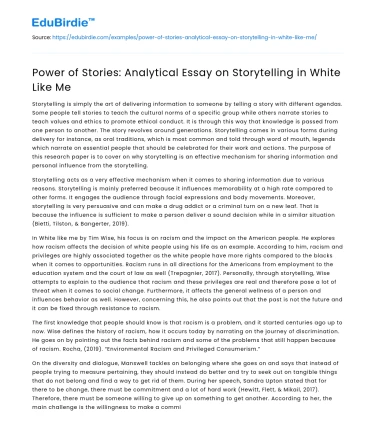Introduction
Storytelling is a profound tool for shaping perceptions and influencing societal change. Tim Wise's "White Like Me" offers an illuminating exploration of racial privilege in America through a personal narrative lens. Wise's adept use of storytelling not only elucidates the complexities of race but also encourages readers to confront their own biases and assumptions. This essay examines the power of narratives in "White Like Me," analyzing how personal stories can foster empathy and understanding, challenge entrenched stereotypes, and catalyze socio-political transformation. While some may argue that individual stories lack the empirical rigor of statistical analysis, this essay posits that the emotional resonance and relatability of personal narratives make them equally, if not more, potent in driving change. By weaving personal anecdotes with broader societal observations, Wise crafts a compelling argument that invites readers to reflect on their own experiences and the pervasive nature of privilege.
The Role of Personal Narratives in Fostering Empathy
Personal narratives serve as a bridge between diverse experiences, enabling readers to connect with perspectives that differ from their own. In "White Like Me," Tim Wise utilizes his life stories to shed light on the often unrecognized benefits of white privilege. For instance, Wise recounts his educational journey, illustrating how race afforded him opportunities that were often denied to his peers of color. This relatability draws readers in, allowing them to vicariously experience the implicit advantages of whiteness. According to psychologist Paul Zak, stories stimulate the production of oxytocin, a hormone associated with empathy and trust, thereby enhancing emotional connections between the storyteller and the audience (Zak, 2015).
Save your time!
We can take care of your essay
- Proper editing and formatting
- Free revision, title page, and bibliography
- Flexible prices and money-back guarantee
Critics may contend that personal narratives lack the objectivity required for scholarly discourse. However, Wise's storytelling is not devoid of analytical depth. Instead, it is interwoven with critical observations that underscore systemic inequalities. By embedding statistical data and historical context within his personal anecdotes, Wise effectively grounds his narrative in a broader socio-political framework. This dual approach not only validates his personal experiences but also amplifies their impact. Thus, storytelling emerges as a potent tool for fostering empathy, prompting readers to reassess their own positions within societal hierarchies. Furthermore, Wise's narratives challenge readers to confront the uncomfortable realities of privilege, urging them to become allies in the fight against racial injustice.
Challenging Stereotypes Through Storytelling
Storytelling possesses the transformative power to challenge and dismantle stereotypes. In "White Like Me," Wise leverages his narrative to confront pervasive myths about race and privilege. Through candid accounts of his interactions with friends, colleagues, and strangers, Wise exposes the subtle yet insidious nature of racial bias. For example, he recounts an incident where he was assumed to be more competent than his Black colleagues, despite having similar qualifications. Such stories compel readers to reflect on the unconscious biases that shape their perceptions and interactions.
Sociologist Claude Steele's research on stereotype threat underscores the significance of narratives in reshaping societal attitudes (Steele, 2010). By humanizing the experiences of marginalized groups, storytelling can counteract the negative stereotypes that often pervade public discourse. Wise's narrative strategy focuses on highlighting commonalities rather than differences, fostering a sense of shared humanity. This approach not only challenges reductive stereotypes but also encourages readers to question the societal structures that perpetuate inequality. The visceral impact of personal stories often transcends that of abstract data, making them a powerful vehicle for challenging entrenched stereotypes and promoting social change.
Narratives as Catalysts for Socio-Political Change
Beyond fostering empathy and challenging stereotypes, storytelling can serve as a catalyst for socio-political change. "White Like Me" exemplifies how personal narratives can inspire action and advocacy. Wise's stories reveal the systemic nature of racial privilege, prompting readers to consider their role in perpetuating or dismantling these structures. By sharing his journey towards racial awareness, Wise provides a roadmap for others seeking to engage in anti-racist work.
While some may argue that storytelling alone is insufficient to effect change, it is crucial to recognize its role in shaping public discourse and influencing policy. The civil rights movement, for example, was fueled by the personal testimonies of individuals who experienced racial injustice firsthand. Wise's narratives operate in a similar vein, galvanizing readers to advocate for equity and justice. Furthermore, storytelling can serve as a powerful tool for coalition-building, uniting individuals across diverse backgrounds in a shared commitment to social change. In this way, the narratives in "White Like Me" transcend mere storytelling, functioning as a call to action for a more equitable society.
Conclusion
In "White Like Me," Tim Wise harnesses the power of storytelling to illuminate the realities of racial privilege and inspire transformative change. Through personal narratives, Wise fosters empathy, challenges stereotypes, and catalyzes socio-political action. While some may argue that personal stories lack the empirical rigor of quantitative analysis, their emotional resonance and relatability render them an invaluable tool for social advocacy. By inviting readers to engage with his experiences, Wise not only raises awareness of systemic injustices but also empowers individuals to become agents of change. Ultimately, "White Like Me" demonstrates that storytelling is not merely a means of sharing experiences but a potent force for shaping societal attitudes and fostering a more just and inclusive world.






 Stuck on your essay?
Stuck on your essay?

